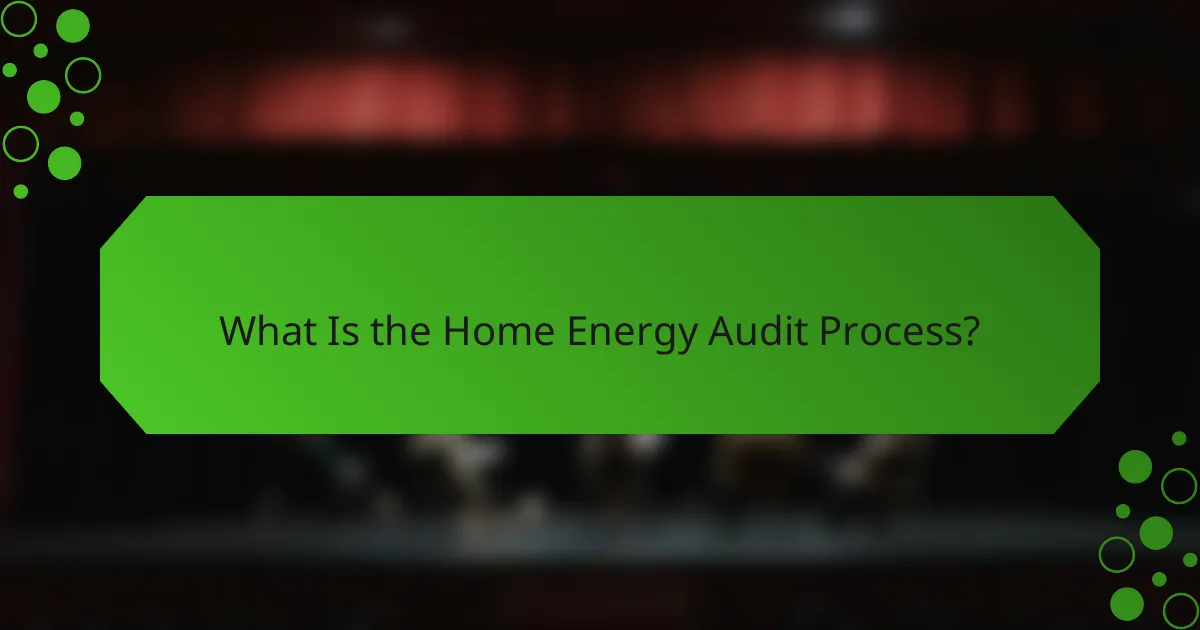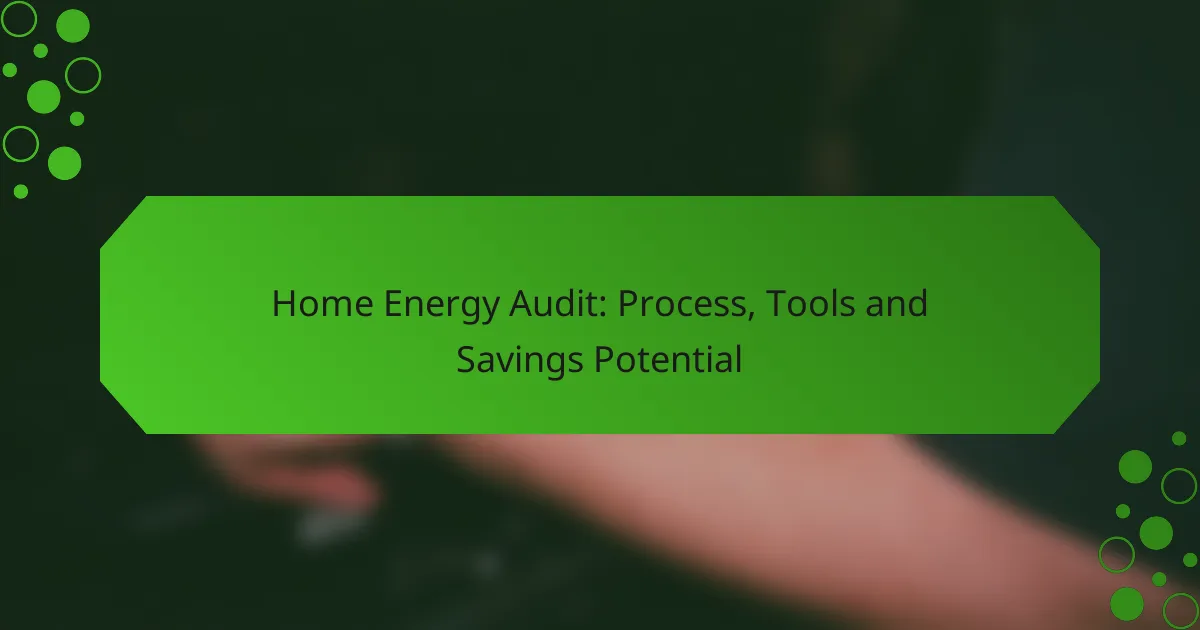A home energy audit is a valuable process that helps homeowners identify energy inefficiencies and potential savings, ultimately leading to reduced utility bills and increased property value. This systematic evaluation involves an initial assessment, diagnostic testing, and a comprehensive report with actionable recommendations. Utilizing specialized tools, the audit pinpoints areas where energy is lost, providing insights for enhancing comfort and efficiency in the home.

How Can a Home Energy Audit Save You Money?
A home energy audit can significantly reduce your energy costs by identifying areas where your home is losing energy and suggesting improvements. By addressing these inefficiencies, homeowners can lower their utility bills and potentially increase the value of their property.
Identifying energy inefficiencies
The first step in a home energy audit is to pinpoint energy inefficiencies throughout your home. This process typically involves a thorough inspection of insulation, windows, doors, and heating and cooling systems. Professional auditors may use tools like blower doors and thermal imaging cameras to detect air leaks and insulation gaps.
Common inefficiencies include drafty windows, poorly insulated attics, and outdated HVAC systems. Identifying these issues allows homeowners to prioritize repairs that will yield the greatest energy savings.
Reducing utility bills
By addressing the inefficiencies found during the audit, homeowners can significantly reduce their utility bills. Simple measures, such as sealing air leaks and upgrading insulation, can lead to savings of 10-30% on heating and cooling costs. More substantial investments, like replacing an old furnace or air conditioner, can further enhance savings over time.
It’s essential to track your energy usage before and after implementing changes to see the impact on your bills. Many utility companies offer tools or apps to help monitor consumption effectively.
Accessing rebates and incentives
Homeowners should research available programs in their area, as eligibility and amounts can vary widely. Websites like the U.S. Department of Energy or local utility company resources can provide valuable information on available incentives.

What Is the Home Energy Audit Process?
The home energy audit process involves a systematic evaluation of a home’s energy use to identify inefficiencies and potential savings. This typically includes an initial assessment, diagnostic testing, and a final report with actionable recommendations.
Initial assessment
The initial assessment begins with a walkthrough of the home, where an auditor reviews energy bills, insulation levels, and the condition of windows and doors. Homeowners should be prepared to discuss their energy usage patterns and any specific concerns.
During this phase, the auditor may also check for drafts and inspect heating and cooling systems. This step helps establish a baseline for energy consumption and identifies areas that need further investigation.
Diagnostic testing
Diagnostic testing involves using specialized tools to measure the home’s energy efficiency. Common tests include blower door tests, which assess air leakage, and thermographic inspections that reveal insulation gaps.
These tests provide quantitative data on energy loss, allowing for a more precise understanding of where improvements can be made. Homeowners may want to ensure that the auditor uses equipment that meets local standards for accuracy.
Final report and recommendations
The final report summarizes the findings from the audit and provides tailored recommendations for improving energy efficiency. This may include suggestions for insulation upgrades, air sealing, or more efficient appliances.
Homeowners should review the report carefully and consider the cost-effectiveness of each recommendation. Prioritizing improvements based on potential savings can maximize the benefits of the audit, often leading to reduced energy bills over time.

What Tools Are Used in Home Energy Audits?
Home energy audits utilize various tools to assess energy efficiency and identify areas for improvement. These tools help pinpoint energy losses and provide actionable insights for homeowners looking to reduce utility costs and enhance comfort.
Blower door test equipment
Blower door test equipment measures the airtightness of a home by creating a pressure difference between the inside and outside. This test helps identify leaks in the building envelope, which can lead to significant energy loss. Homeowners should consider scheduling this test, especially if they notice drafts or inconsistent temperatures in different rooms.
During the test, a fan is mounted in an exterior door frame, and the home is depressurized. The results indicate the air changes per hour (ACH), guiding homeowners on necessary sealing or insulation improvements. A typical ACH value for a well-sealed home is often below 3.
Infrared cameras
Infrared cameras detect temperature variations in building materials, revealing hidden issues such as insulation gaps or moisture intrusion. By visualizing heat loss, these cameras provide a clear picture of where energy efficiency can be improved. Homeowners can use this tool to target specific areas for upgrades, like adding insulation or sealing ducts.
Using an infrared camera during a home energy audit can help identify problems that are not visible to the naked eye. For best results, audits should be conducted when there is a significant temperature difference between the inside and outside, ideally during colder months.
Energy monitoring devices
Energy monitoring devices track real-time energy consumption, helping homeowners understand their usage patterns and identify areas for savings. These devices can be installed at the circuit level or used as plug-in units for specific appliances, providing detailed insights into energy hogs.
By analyzing data from energy monitors, homeowners can make informed decisions about usage habits and potential upgrades. For example, if a monitor shows that heating or cooling systems consume a disproportionate amount of energy, it may be time to consider more efficient models or smart thermostats.

Which Companies Offer Home Energy Audits in the US?
Several companies provide home energy audits across the United States, helping homeowners identify energy inefficiencies and potential savings. These services can range from free assessments by local utilities to comprehensive evaluations by private firms.
Energy Star partners
Energy Star partners include a network of organizations that offer home energy audits as part of their commitment to energy efficiency. These partners often provide resources and tools to help homeowners understand their energy use and improve efficiency. Many Energy Star partners may offer rebates or incentives for implementing recommended improvements.
Local utility providers
Local utility providers frequently conduct home energy audits to promote energy conservation among their customers. These audits are often subsidized or free, making them an accessible option for homeowners. Utility companies may offer tailored recommendations based on your specific energy usage patterns and may also provide financial incentives for energy-saving upgrades.
Private energy audit firms
Private energy audit firms specialize in detailed assessments of residential energy use, often using advanced tools and techniques. These firms typically charge a fee for their services, which can vary based on the complexity of the audit and the size of the home. Homeowners should consider the potential savings from energy efficiency improvements when evaluating the cost of these audits.

What Are the Benefits of Conducting a Home Energy Audit?
Conducting a home energy audit offers several benefits, including enhanced energy efficiency, cost savings, and improved comfort. By identifying areas where energy is wasted, homeowners can make informed decisions to reduce their utility bills and increase their home’s overall performance.
Improved comfort
A home energy audit helps pinpoint drafts, insulation gaps, and inefficient heating or cooling systems that can lead to discomfort. By addressing these issues, homeowners can create a more consistent indoor temperature, reducing hot or cold spots throughout the house.
For example, sealing air leaks and upgrading insulation can lead to a more stable environment, making living spaces more enjoyable year-round. Homeowners may notice a significant difference in comfort levels, especially during extreme weather conditions.
Increased home value
Investing in a home energy audit can enhance property value by making the home more attractive to potential buyers. Energy-efficient homes are often seen as more desirable, as they promise lower utility costs and a reduced environmental footprint.
Upgrades resulting from an energy audit, such as improved insulation or energy-efficient appliances, can yield a return on investment. Homeowners may find that these enhancements not only make their homes more comfortable but also increase their resale value by a notable percentage.
